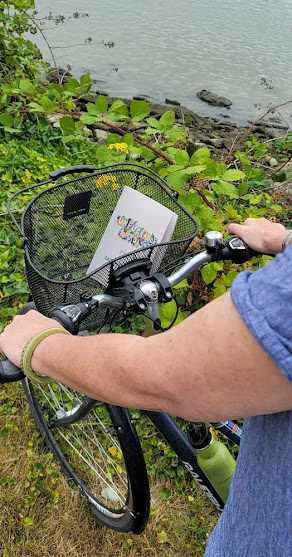My first experience with poetry, and by extension with poets, was at or on my mother’s knee. Mum read to me at least twice daily during my early years, and at bedtime for years after that, with a happy attention that was otherwise diffused (I’m the youngest of five, and our mum was most often occupied either with housework and otherwise fulfilling the endless needs of others or away at work). Books offered not an alternate reality, but what I understood to be reality itself: a shared joyous connection, my mother’s full attention, made available in language, through collaborative reading. Because our reading and our pleasure was collaborative – we would discuss the books we read together, expand on them, laugh about them, I would add as she read; they infused our lives (years later, I was to experience this same glorious mutual immersion reading to my own kids).
I grew up steeped in language, in the rhythm and cadence of nursery rhymes and lullabies, in silly, joyous wordplay, in the kids’ books and folk tales (not to mention the snippets of songs, shards of Shakespeare, and strange British sayings I didn’t understand) that are inextricably entwined for me, within me, with my mother’s voice (my father rarely read to me, although he did share our pleasure in language). From infancy, I experienced language and maternal caring as fully enmeshed. I mean this literally – I experienced the sharing of books, of language, as a foundational caring act and one of the richest expressions of love, that deep well of parental love where I was fortunate enough to dwell in my youngest years; consequently, language is still awash with love for me, no matter how harsh, angry, or despairing.
To state this is not to idealize the mother-daughter relationship, nor the English language and its violences, for the contradictions both present are woven into the fabric of the linguistic connection my mother and I fostered, as they were into our relationship in general. Perhaps the most fruitful of these contradictions for me was a strong thread of resistance. For the repressive patriarchal and often colonial instruction carried in so much of our reading was actively subverted by my experience of maternal power, by my mother’s voice undercutting, in the very act and conditions of her delivery, the message she ostensibly conveyed. So that while I experienced in our shared reading the bliss of maternal care, I also absorbed an understanding of the layered complexities always present in language and the rich possibilities those nuances present for resistance from within – possibilities my mother did not articulate, but clearly demonstrated.
A founding member of the Institute for Domestic Research, Catriona Strang [photo credit: Spencer Williams] is the author of Low Fancy, Corked, Reveries of a Solitary Biker, and Unfuckable Lardass and co-author of Busted, Cold Trip, and Light Sweet Crude with the late Nancy Shaw, whose selected works, The Gorge, she edited.
She frequently collaborates with composer Jacqueline Leggatt, and lives with her two grown kids on unceded xʷməθkʷəy̓əm, Sḵwx̱wú7mesh, and səl̓ilwətaɁɬ Lands.


